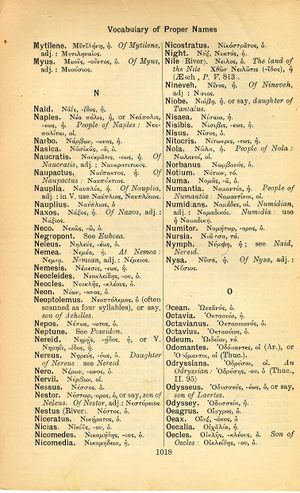Nessus
προγράψαντες οὖν τά τε θεωρήματα καὶ τὰ ἐπιτάγματα τὰ χρεῖαν ἔχοντα εἰς τὰς ἀποδείξιας αὐτῶν μετὰ ταῦτα γραψοῦμές τοι τὰ προκείμενα → having therefore written at the beginning the theorems and the postulates that are necessary for their proofs, we will then write out for you the propositions
English > Greek (Woodhouse)
Νέσσος, ὁ.
Latin > English (Lewis & Short)
Nessus: i, m., = Νέσσος.
I A river in Thrace, now the Mesto or (Turkish) Karasu, Liv. 45, 29, 6; also called Nestos ( = Νέστος), Mel. 2, 2.—
II A Centaur, who, on offering violence to Dejanira, was slain by Hercules with a poisoned arrow, Ov. M. 9, 101 sq.; Hyg. Fab. 34.—Hence,
III Nessēus, a, um, adj., of Nessus: venenum, with the blood of Nessus, poisoned by the arrow of Hercules, Ov. H. 9, 163: palla tabe Nesseā illita, Sen. Herc. Oet. 716.
Latin > French (Gaffiot 2016)
Nessus,¹² ī, m. (Νέσσος), centaure tué par Hercule : Ov. M. 9, 101 ; Hyg. Fab. 34 || rivière de Thrace : Liv. 45, 29, 6.
Latin > German (Georges)
Nessus, ī, m. (Νέσσος), I) ein Fluß in Thracien, der auf dem Gebirge Rhodope entspringt u. in das Ägäische Meer fällt, j. Mesto, bei den Türken Karasu, Liv. 45, 29, 6. – urspr. Nestos (Νέστος) gen., Mela 2, 2, 2 u. 9 (2. § 17 u. 30). – II) ein Zentaur in Ätolien, der von Herkules, als er die Deïanira entführen wollte, getötet wurde, aber sterbend der Deïanira das mit seinem giftigen Blute getränkte Gewand als Liebesmittel gab (s. Herculēs), Ov. met. 9, 101. Hyg. fab. 34. – Dav. Nessēus, a, um (Νέσσειος), nessëisch, des Nessus, venenum, Ov.: tabes, Sen. poët.

